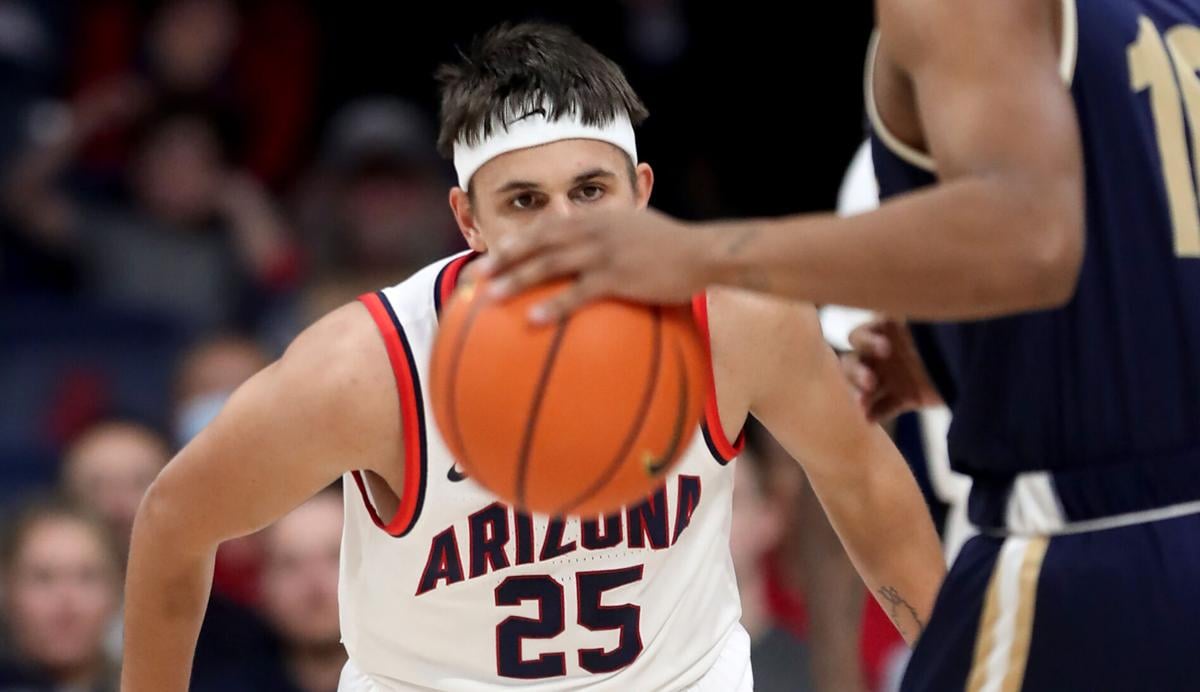When an Independent Accountability Resolution Process panel last week ruled against giving Arizona a postseason ban or scholarship loss beyond what the Wildcats already have self-imposed, it wasn’t hard to imagine a quiet celebration happening on the UA campus.
Maybe even a little party.
But, even if there was such a thing, UA coach Tommy Lloyd indicated he wasn’t there. When asked about the IARP’s decision after the Wildcats beat Montana State 85-64 on Tuesday, Lloyd indicated he still really hadn’t processed it fully.
He answered a few questions about the decision toward the end of his postgame press conference, then exited with Brent Blaylock, the UA’s senior associate athletic director for administration and institutional control.
“My general feel is we’re through it. I’ll sit down with Brent and then we’ll make the decisions going forward that are best for the program,” Lloyd said. “But I’m glad that at least we have an opportunity to sit down and talk about what it actually looks like rather than speculate. We just haven’t had time. We’ve been busy.”
The stiffest penalties Arizona was handed were a fine of about $135,000 — $5,000 plus 1% of the UA men’s basketball budget — and a loss of one scholarship for either the 2022-23 or 2023-24 seasons.
Arizona has just 12 players on its current roster, one down from the maximum of 13, suggesting the Wildcats can absorb the penalty without doing a thing. (The IARP referred comment to UA on whether the scholarship limitation has been officially satisfied, but a request for comment from UA officials beyond their initial statements was unsuccessful.)
Lloyd said no definitive discussions about handling the penalties have been held yet, as Arizona finishes out its pre-Christmas schedule. Just three days after the IARP’s decision, Arizona took on then-No. 6 Tennessee in its biggest game of the season and this week has been hosting Montana State and Morgan State for its final two pre-Christmas games.
“We’re still having conversations about all that,” Lloyd said. “I just told everybody, ‘Hey, obviously the school and the program went through a lot the last few years. Let’s take a breath, get through these games and then we can start dissecting what actually happened.’
“Obviously, there were penalties. The program suffered a lot. All parties suffered. Now we’re through it and thankfully everybody can move on. So I think it’s a great opportunity to hit ‘reset’ a little bit. … But I haven’t even sat down with — it’s probably gonna be Brent — and he’ll interpret all these things for me, all these legalese things that I’m not used to.”
Even though UA’s case stemmed from actions when the program was run by former UA coach Sean Miller, bracing for the IARP decision has been a part of Lloyd’s existence since the moment he was hired in April 2021. His initial contract included language saying he would have his contract extended by a year if another year’s postseason ban was added.
That won’t be necessary now, though Lloyd said after the Wildcats’ somewhat lackadaisical win over Montana State that he was worried more about what was happening on the court than his contract.
“Worried about making my team feel better, and play better,” Lloyd said.
As Lloyd also noted, the Wildcats did already suffer from self-imposed penalties. The IARP said UA self-imposed several recruiting penalties including a one-scholarship limitation in 2022-23, all of which the IARP accepted.
The IARP then added only a seven-week ban on recruiting communication for current UA coaches during the 2022-23 academic year and a reduction of two days of in-person recruiting in 2022-23.
Of course, the postseason ban of 2020-21 was the most significant penalty. At 17-9 during that COVID-limited season, Arizona may have ultimately been on the NCAA Tournament bubble anyway. Nevertheless, the school announced its ban at a time when the Wildcats were on a clear track to make it, just a day after they beat Colorado to go 7-1.
Two Arizona players who sat out that postseason, Azuolas Tubelis and Kerr Kriisa, are still around this season. But, like Lloyd, Kriisa declined to express a whole lot about his reaction.
“I don’t think it’s really my place and time to comment (on) this kind of thing,” Kriisa said. “I’m just happy to how things are and only forward from here.”
Theoretically, had the Wildcats’ case been processed as Level I-aggravated instead of Level I-standard, the Wildcats could have faced another year or more of a postseason ban, this season or in the future.
But senior forward Cedric Henderson said that sort of thought was not running through the back of their minds.
“That’s not anything to do with us,” Henderson said. “That’s for them to worry about. We have one job and that’s to win games, to play our hardest.”
McKale Center was built at the University of Arizona in the early 1970s. There have been updates through the years.





